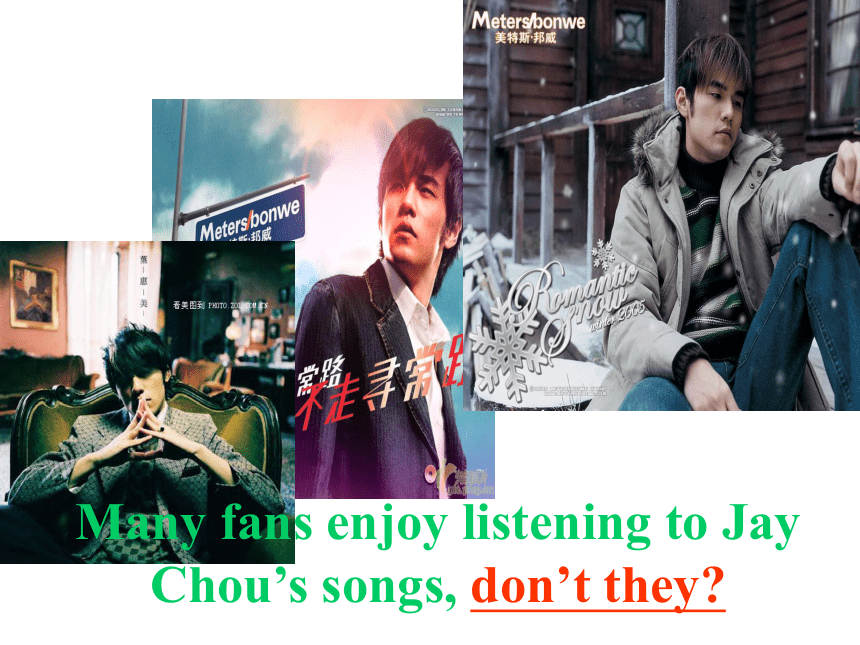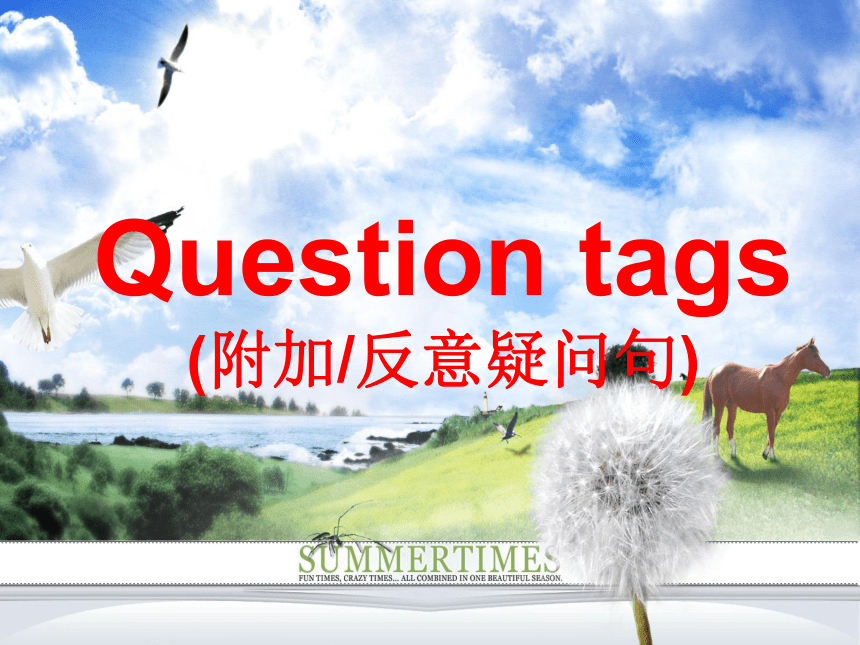反意疑问句(江苏省宿迁市泗洪县东方中学赵丹)
文档属性
| 名称 | 反意疑问句(江苏省宿迁市泗洪县东方中学赵丹) |  | |
| 格式 | rar | ||
| 文件大小 | 25.0MB | ||
| 资源类型 | 教案 | ||
| 版本资源 | 牛津译林版 | ||
| 科目 | 英语 | ||
| 更新时间 | 2008-03-15 08:00:00 | ||
图片预览









文档简介
课件26张PPT。江苏省宿迁市泗洪县
东方中学 高一年级英语组
制作人:赵丹You want to experience the beauty of nature, don’t you?The gym is very magnificent, isn’t it?Haerbin is a beautiful city, isn’t it?Skiing in Heilongjiang is very exciting, isn’t it? Jolin can dance well, can’t she?Li Yuchun looks like a boy, doesn’t she?Many fans enjoy listening to Jay Chou’s songs, don’t they?Question tags
(附加/反意疑问句)Think about: 1. What are Question tags?J
2. What are the functions of Question tags?JPay attention to the intonation:S: May I come in?
T: Yes, please come in. You’re late, aren’t you?
S: Yes, I’m sorry. But…
T: You got up late, didn’t you?
S: No, I just didn’t feel good.
T: I’m sorry to heat that. You should take care of youself. Please go back to your seat.
语调T: Yes, please come in.
You’re late, aren’t you?T: You got up late, didn’t you?(falling intonation, ask for agreement)
(请求同意)(rising intonation, ask for confirmation)
(请求肯定)The rules of forming question tags:New words:positive adj. 肯定的
negative adj. 否定的
personal pronoun 人称代词
auxiliary verb 助动词
modal verb 情态动词
be be动词
imperative clause 祈使句1. 前肯后否,前否后肯。e.g. 1. We can still be friends, can’t we?
2. He doesn’t like ice cream, does he?
3. He has changed too much, ______hasn’t he?2. 当陈述部分有neither, none, nobody, nothing, few, little(难得,很少), never, hardly, seldom等否定词时,附加疑问部分用肯定形式。e.g.
1. Neither of you will have coffee, ________?
2. No one has found my CD, _________?
3. Nobody understood his speech, _______?
4. His sister seldom argues with people, _______?will you have theydid theydoes she3.附加疑问句的主语部分我们用代词I, we, you, he, she, it或they。e.g.
1. I was pretty silly, ________?
2. His father can’t name the plant, ______?
3. You wouldn’t like to take these pills, _________?
4. Everyone has advised you not to go on a diet, ___________?wasn’t Ican hewould youhaven’t they4. 在附加疑问句谓语动词部分我们使用助动词,情态动词和be动词。e.g.
1. You like travelling, _________?
2. There is something wrong, _________?
3. You can’t speak Italian, _______?don’t youisn’t therecan you5. 陈述部分是祈使句时,我们使用will you; 但是在Let’ s后,我们使用shall we。e.g.1. Post a letter for me, _______?
2. Let us have a break, _______?
3. Let’ s have a break, _______?will youshall wewill you auxiliary verb(助动词) be(be动词) +代词 modal verb(情态动词) ①谓语动词 ②主语 反意疑问句由2个部分组成:don’t youExercise: 1. You know who they are, _________? 2. He is in Paris, _______? 3. He doesn’t like talking too much, _______? 4. She looks pretty, __________? 5. They are married now, _________? 6. You can hardly recognize him in the photo, _______? 7. Everyone in the picture seems to have put on some weight, _________? 8. You can always see how much time has passed since they were taken, ________?don’t youisn’t hedoes hedoesn’t shearen’t theycan youdon’t theycan’t youHomework: 1. Preview Task; 2. Finish ex.B on P51.Thank you.Question tags are short questions that come at the end of statements.J1. to start a conversation ;
2. to request information in a more polite way;
3. to soften an order or request for someone to do something;
4. to use them to ask for agreement
or confirmation.J请求同意确认2.There are a group of little children in the museum, ___________?1.You go there very little, _______?aren’t theredo youadv. 难得;
很少
adj.小的
T: Yes, please come in. You’re late, aren’t you?
S: Yes, I’m sorry. But…
T: You got up late, didn’t you?
S: No, I just didn’t feel good.
T: I’m sorry to heat that. You should take care of youself. Please go back to your seat.
语调T: Yes, please come in.
You’re late, aren’t you?T: You got up late, didn’t you?(falling intonation, ask for agreement)
(请求同意)(rising intonation, ask for confirmation)
(请求肯定)The rules of forming question tags:New words:positive adj. 肯定的
negative adj. 否定的
personal pronoun 人称代词
auxiliary verb 助动词
modal verb 情态动词
be be动词
imperative clause 祈使句1. 前肯后否,前否后肯。e.g. 1. We can still be friends, can’t we?
2. He doesn’t like ice cream, does he?
3. He has changed too much, ______hasn’t he?2. 当陈述部分有neither, none, nobody, nothing, few, little(难得,很少), never, hardly, seldom等否定词时,附加疑问部分用肯定形式。e.g.
1. Neither of you will have coffee, ________?
2. No one has found my CD, _________?
3. Nobody understood his speech, _______?
4. His sister seldom argues with people, _______?will you have theydid theydoes she3.附加疑问句的主语部分我们用代词I, we, you, he, she, it或they。e.g.
1. I was pretty silly, ________?
2. His father can’t name the plant, ______?
3. You wouldn’t like to take these pills, _________?
4. Everyone has advised you not to go on a diet, ___________?wasn’t Ican hewould youhaven’t they4. 在附加疑问句谓语动词部分我们使用助动词,情态动词和be动词。e.g.
1. You like travelling, _________?
2. There is something wrong, _________?
3. You can’t speak Italian, _______?don’t youisn’t therecan you5. 陈述部分是祈使句时,我们使用will you; 但是在Let’ s后,我们使用shall we。e.g.1. Post a letter for me, _______?
2. Let us have a break, _______?
3. Let’ s have a break, _______?will youshall wewill you auxiliary verb(助动词) be(be动词) +代词 modal verb(情态动词) ①谓语动词 ②主语 反意疑问句由2个部分组成:don’t youExercise: 1. You know who they are, _________? 2. He is in Paris, _______? 3. He doesn’t like talking too much, _______? 4. She looks pretty, __________? 5. They are married now, _________? 6. You can hardly recognize him in the photo, _______? 7. Everyone in the picture seems to have put on some weight, _________? 8. You can always see how much time has passed since they were taken, ________?don’t youisn’t hedoes hedoesn’t shearen’t theycan youdon’t theycan’t youHomework: 1. Preview Task; 2. Finish ex.B on P51.Thank you.Question tags are short questions that come at the end of statements.J1. to start a conversation ;
2. to request information in a more polite way;
3. to soften an order or request for someone to do something;
4. to use them to ask for agreement
or confirmation.J请求同意确认2.There are a group of little children in the museum, ___________?1.You go there very little, _______?aren’t theredo youadv. 难得;
很少
adj.小的
